--The Emperor Justinian in A.D. 537, upon viewing the completed Cathedral of Holy Wisdom (Hagia Sophia in Greek). After the fall of Constantinople in A.D. 1453, Hagia Sophia was turned into a mosque, which entailed the painting over of the magnificent frescoes adorning the church. However, Kemal Ataturk, the first president of modern Turkey, ordered the building converted into a museum in 1934, and the frescoes are still in the process of being restored. The Turkish Republic has been, with the exception of renaming Constantinople "Istanbul," a solid (if not flawless), custodian of the city's Byzantine past.
Hagia Sophia still dominates the skyline today:
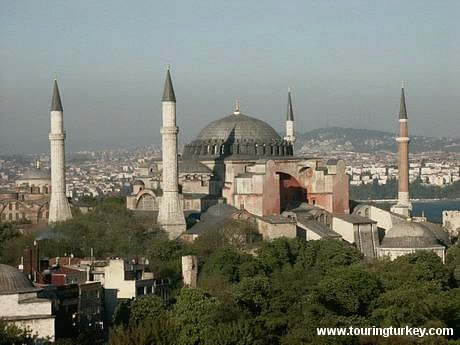
Another view:
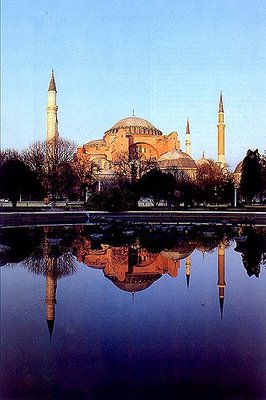
From the East:
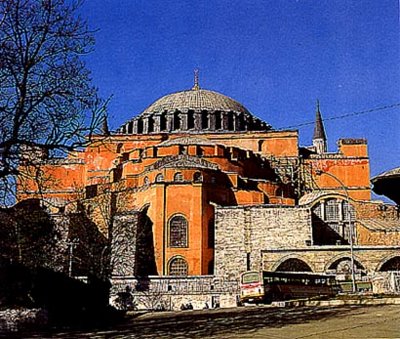
And then there is the interior:
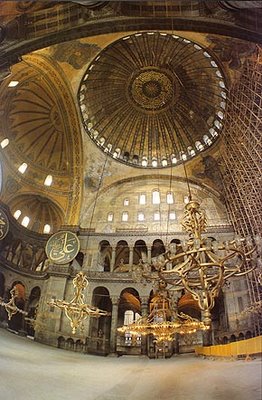
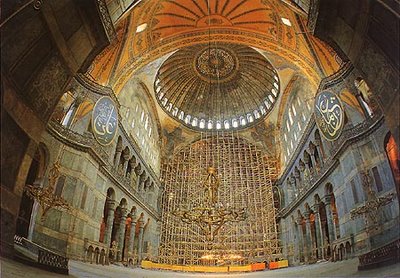
Now for the frescoes:

This one is a closeup of the above, and depicts Justinian (left) presenting Hagia Sophia to the Infant Christ and the Virgin, and Constantine (right) presenting Constantinople to them.
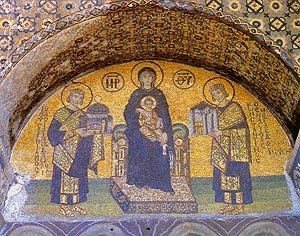
Christ Pantocrator:
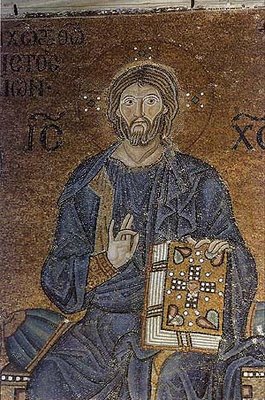 Next is a depiction of the Emperor John II Komnenos (Comnenus) (reigned 1118-1143) and his wife, the Empress Irene. John was beloved by his subjects and called "the Good." He never had anyone tortured or mutilated during his reign, which included a coup attempt at its very beginning by his elder sister, Anna (the famous historian and author of The Alexiad). It is suspected that Anna's reluctant husband, Nikephoros Bryennios, who was expected to be emperor if the plot succeeded, warned John. By the standards of the time, he was very lenient, merely sending the plotters off to a semi-comfortable banishment and confiscating their property. Moreover, he enjoyed several military successes, pushing back the Seljuk Turks and recovering territory lost to the Turks during the previous century. He and his wife also founded a large modern hospital for the poor in Constantinople:
Next is a depiction of the Emperor John II Komnenos (Comnenus) (reigned 1118-1143) and his wife, the Empress Irene. John was beloved by his subjects and called "the Good." He never had anyone tortured or mutilated during his reign, which included a coup attempt at its very beginning by his elder sister, Anna (the famous historian and author of The Alexiad). It is suspected that Anna's reluctant husband, Nikephoros Bryennios, who was expected to be emperor if the plot succeeded, warned John. By the standards of the time, he was very lenient, merely sending the plotters off to a semi-comfortable banishment and confiscating their property. Moreover, he enjoyed several military successes, pushing back the Seljuk Turks and recovering territory lost to the Turks during the previous century. He and his wife also founded a large modern hospital for the poor in Constantinople:
 Sts. John Chrysostom and Ignatius of Antioch, respectively:
Sts. John Chrysostom and Ignatius of Antioch, respectively:
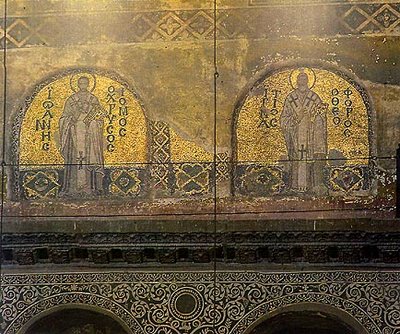
More incurable Byzantinophilia to come. [All links except the first via the magnificent website of the Ecumenical Patriarchate of Constantinople.]


No comments:
Post a Comment
Be reasonably civil. Ire alloyed with reason is fine. But slagging the host gets you the banhammer.